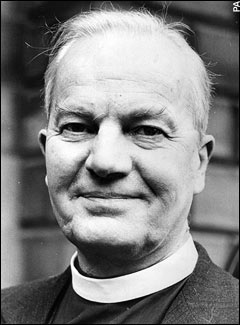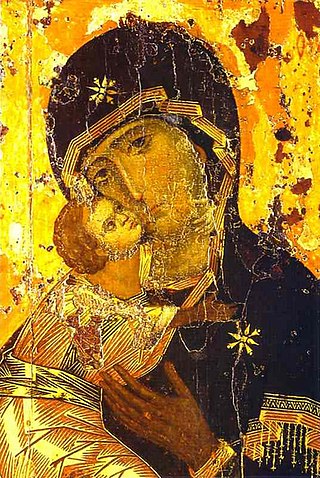Related Research Articles

The Immaculate Conception is the belief that the Virgin Mary was free of original sin from the moment of her conception. It is one of the four Marian dogmas of the Catholic Church. Debated by medieval theologians, it was not defined as a dogma until 1854, by Pope Pius IX in the papal bull Ineffabilis Deus. While the Immaculate Conception asserts Mary's freedom from original sin, the Council of Trent, held between 1545 and 1563, had previously affirmed her freedom from personal sin.

Karl Barth was a Swiss Reformed theologian. Barth is best known for his commentary The Epistle to the Romans, his involvement in the Confessing Church, including his authorship of the Barmen Declaration, and especially his unfinished multi-volume theological summa the Church Dogmatics. Barth's influence expanded well beyond the academic realm to mainstream culture, leading him to be featured on the cover of Time on 20 April 1962.
The five solae of the Protestant Reformation are a foundational set of Christian theological principles held by theologians and clergy to be central to the doctrines of justification and salvation as taught by the Calvinism and Lutheranism branches of Protestantism, as well as in some sects of Pentecostalism. Each sola represents a key belief in these Protestant traditions that is distinct from the theological doctrine of the Catholic Church, although they were not assembled as a theological unit until the 20th century. The Reformers are known to have only clearly stated two of the five solae. Even today there are differences as to what constitutes the solae, how many there are, and how to interpret them to reflect the Reformers' beliefs.
The following outline is provided as an overview of and topical guide to Christian theology:

Thomas Forsyth Torrance, commonly referred to as T. F. Torrance, was a Scottish Protestant theologian and minister. He was a member of the famed Torrance family of theologians. Torrance served for 27 years as professor of Christian dogmatics at New College, in the University of Edinburgh. He is best known for his pioneering work in the study of science and theology, but he is equally respected for his work in systematic theology.

Catholic Mariology is Mariology in Catholic theology. According to the Immaculate Conception taught by the Catholic Church, she was conceived and born without sin, hence Mary is seen as having a singular dignity above the saints, receiving a higher level of veneration than all angelic spirits and blessed souls in heaven. Catholic Mariology thus studies not only her life but also the veneration of her in daily life, prayer, hymns, art, music, and architecture in modern and ancient Christianity throughout the ages.
Dogmatic theology, also called dogmatics, is the part of theology dealing with the theoretical truths of faith concerning God and God's works, especially the official theology recognized by an organized Church body, such as the Roman Catholic Church, Dutch Reformed Church, etc. At times, apologetics or fundamental theology is called "general dogmatic theology", dogmatic theology proper being distinguished from it as "special dogmatic theology". In present-day use, however, apologetics is no longer treated as part of dogmatic theology but has attained the rank of an independent science, being generally regarded as the introduction to and foundation of dogmatic theology.
Co-Redemptrix is a title used by some Catholics for the Blessed Virgin Mary, and refers to Mary's role in the redemption of all peoples.
Anglican Marian theology is the summation of the doctrines and beliefs of Anglicanism concerning Mary, mother of Jesus. As Anglicans believe that Jesus was both human and God the Son, the second Person of the Trinity, within the Anglican Communion and Continuing Anglican movement, Mary is accorded honour as the theotokos, a Koiné Greek term that means "God-bearer" or "one who gives birth to God".

Mariology is the theological study of Mary, the mother of Jesus. Mariology seeks to relate doctrine or dogma about Mary to other doctrines of the faith, such as those concerning Jesus and notions about redemption, intercession and grace. Christian Mariology aims to place the role of the historic Mary in the context of scripture, tradition and the teachings of the Church on Mary. In terms of social history, Mariology may be broadly defined as the study of devotion to and thinking about Mary throughout the history of Christianity.

Protestant views on Mary include the theological positions of major Protestant representatives such as Martin Luther and John Calvin as well as some modern representatives. While it is difficult to generalize about the place of Mary, mother of Jesus in Protestantism given the great diversity of Protestant beliefs, some summary statements are attempted.

The history of Catholic Mariology traces theological developments and views regarding Mary from the early Church to the 21st century. Mariology is a mainly Catholic ecclesiological study within theology, which centers on the relation of Mary, the Mother of God, and the Church. Theologically, it not only deals with her life but with her veneration in life and prayer, in art, music, and architecture, from ancient Christianity to modern times.

Throughout history, Catholic Mariology has been influenced by a number of saints who have attested to the central role of Mary in God's plan of salvation. The analysis of Early Church Fathers continues to be reflected in modern encyclicals. Irenaeus vigorously defended the title of "Theotokos" or Mother of God. The views of Anthony of Padua, Robert Bellarmine and others supported the doctrine of the Immaculate Conception of the Virgin Mary, which was declared a dogma in 1850.

The Mariology of the popes is the theological study of the influence that the popes have had on the development, formulation and transformation of the Roman Catholic Church's doctrines and devotions relating to the Blessed Virgin Mary.

John Calvin (1509–1564) was a French Protestant theologian during the Protestant Reformation, and one of the most influential reformers. He was a central figure for the Reformed churches, whose theological system is sometimes called Calvinism.
Lutheran Mariology or Lutheran Marian theology is derived from Martin Luther's views of Mary, the mother of Jesus and these positions have influenced those taught by the Lutheran Churches. Lutheran Mariology developed out of the deep Christian Marian devotion on which Luther was reared, and it was subsequently clarified as part of his mature Christocentric theology and piety. Lutherans hold Mary in high esteem, universally teaching the dogmas of the Theotokos and the Virgin Birth. Luther dogmatically asserted what he considered firmly established biblical doctrines such as the divine motherhood of Mary while adhering to pious opinions of the Immaculate Conception and the perpetual virginity of Mary, along with the caveat that all doctrine and piety should exalt and not diminish the person and work of Jesus Christ. By the end of Luther's theological development, his emphasis was always placed on Mary as merely a receiver of God's love and favour. His opposition to regarding Mary as a mediatrix of intercession or redemption was part of his greater and more extensive opposition to the belief that the merits of the saints could be added to those of Jesus Christ to save humanity. Lutheran denominations may differ in their teaching with respect to various Marian doctrines and have contributed to producing ecumenical meetings and documents on Mary.

Ecumenical meetings and documents on Mary, involving ecumenical commissions and working groups, have reviewed the status of Mariology in the Eastern Orthodox, Lutheran, Anglican, and Roman Catholic Churches.

A dogma of the Catholic Church is defined as "a truth revealed by God, which the magisterium of the Church declared as binding". The Catechism of the Catholic Church states:
The Church's Magisterium asserts that it exercises the authority it holds from Christ to the fullest extent when it defines dogmas, that is, when it proposes, in a form obliging Catholics to an irrevocable adherence of faith, truths contained in divine Revelation or also when it proposes, in a definitive way, truths having a necessary connection with these.

Church Dogmatics is the four-volume theological summa and magnum opus of Swiss Protestant theologian Karl Barth and was published in thirteen books from 1932 to 1967. The fourth volume of the Church Dogmatics (CD) is unfinished, and only a fragment of the final part-volume was published, and the remaining lecture notes were published posthumously. The planned fifth volume was never written.
The following outline is provided as an overview of and topical guide to the Catholic Church:
References
- ↑ (Ger. Dialektische Theologie).
- ↑ Barth, Dogmatik im Grundriss, 1947, 125,127
- ↑ Barth, Kirchliche Dogmatic I, 2, 219
- ↑ Catechism of the Catholic Church, 722
- ↑ Church Dogmatics, I, 2, Edinburgh: T. & T. Clark, 1963, 138)
- ↑ Karl Barth (1 January 2004). Church Dogmatics: The doctrine of the word of God (2 pts.). Continuum. pp. 138–. ISBN 978-0-567-05069-4.
- ↑ Church Dogmatics, 138
- ↑ Barth, Kirchliche Dogmatik, I, 2, 154
- ↑ Karl Barth (2 September 2010). Church Dogmatics Study Edition 3: The Doctrine of the Word of God I.2 § 13-15. Continuum. pp. 145–. ISBN 978-0-567-02766-5.
- ↑ Barth, Kirchliche Dogmatik, I, 2, 153
- ↑ Karl Barth (1 January 2004). Church Dogmatics: The doctrine of the word of God (2 pts.). Continuum. pp. 139–. ISBN 978-0-567-05069-4.
- ↑ Church Dogmatics, Vol. 1, p. 143).
- ↑ Barth, Kirchliche Dogmatic, I,2,160
